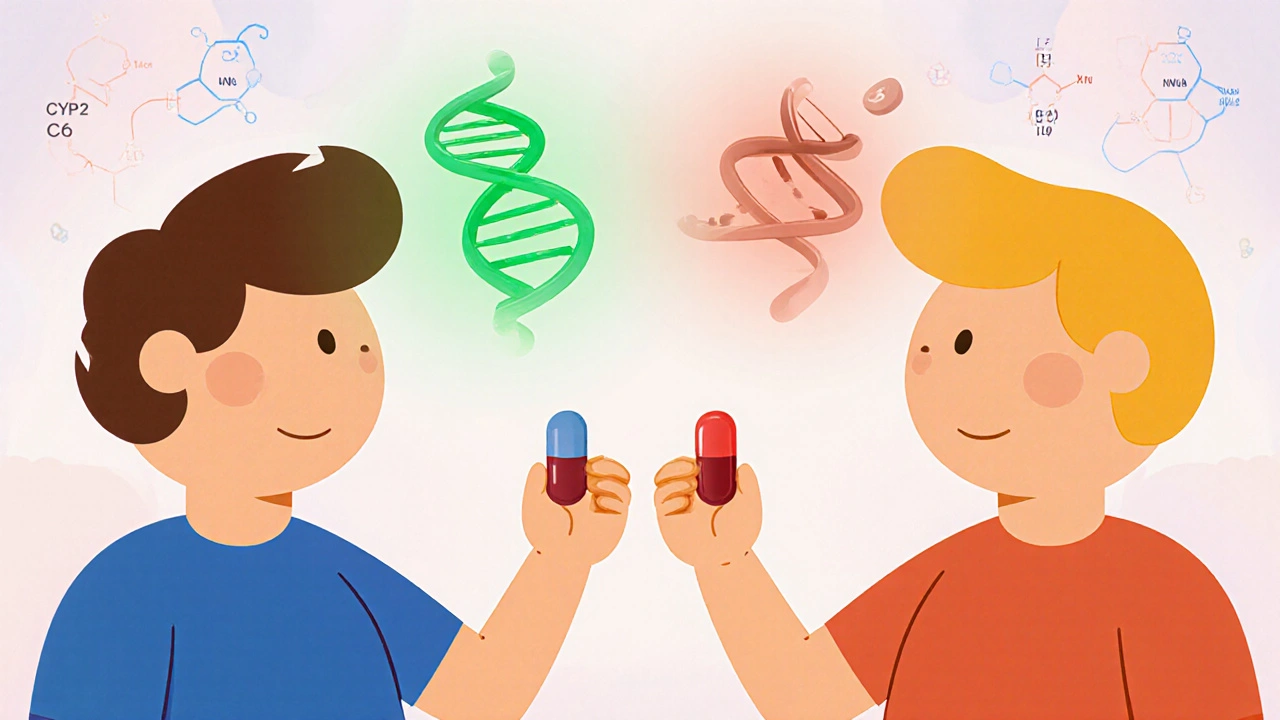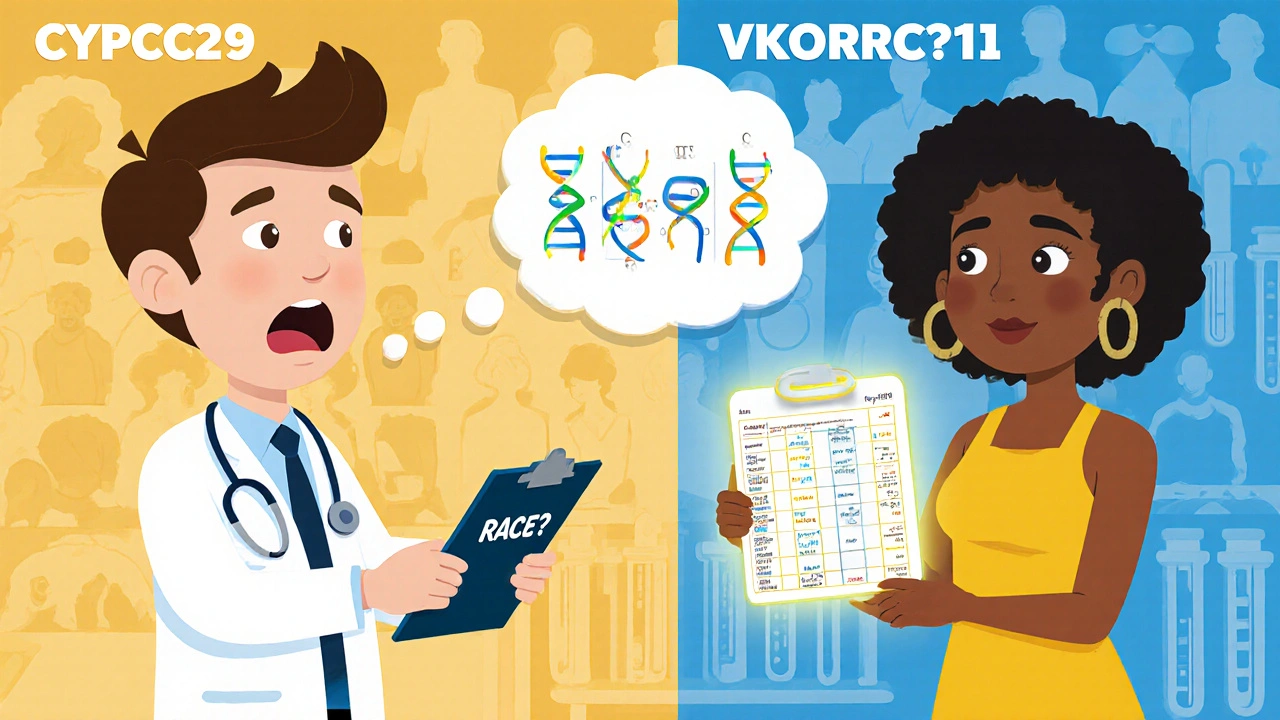Ethnicity and Drug Response: How Genetics Shape Medication Effectiveness

Why the same pill doesn’t work the same way for everyone
You take the same blood pressure pill as your neighbor. You both follow the instructions. But while your neighbor’s numbers drop quickly, yours barely budges. It’s not about compliance. It’s not about lifestyle. It’s about your genes-and the ancestry behind them.
Doctors have long noticed that certain medications work better-or worse-for people of different backgrounds. African Americans often respond poorly to ACE inhibitors. East Asians need lower doses of clopidogrel to avoid side effects. Some people of Asian descent risk life-threatening skin reactions from carbamazepine, while others don’t. These aren’t random quirks. They’re rooted in real, measurable genetic differences that affect how your body breaks down drugs.
Genes, not race: The real drivers of drug response
Race and ethnicity are social categories, not biological ones. But they often line up with shared genetic patterns because of ancestry, migration, and population history. That’s why doctors sometimes see trends: for example, 15-20% of East Asians carry a gene variant that makes clopidogrel (a blood thinner) ineffective. In contrast, only 3-8% of European Americans have it. This isn’t because someone is "Black" or "Asian." It’s because of a specific mutation in the CYP2C19 gene-something you inherit from your parents.
Three key enzyme families control how your body processes most drugs: CYP2D6, CYP2C9, and CYP3A4. These are like factory workers that break down medications so your body can use or remove them. But not everyone has the same workers. Some people have too few, some have too many, and some have broken ones. These variations are called polymorphisms. And they vary wildly across populations.
Take CYP2D6. About 1 in 10 Europeans are "ultrarapid metabolizers"-their bodies clear drugs like codeine or tamoxifen so fast they don’t work. In contrast, 1 in 3 Ethiopians and 1 in 5 Emiratis have the same trait. Meanwhile, 5-10% of East Asians are "poor metabolizers," meaning they can’t process these drugs at all, leading to dangerous buildup. This isn’t about skin color. It’s about which version of the gene your ancestors passed down.
Real-world examples: When ethnicity matters in prescribing
The most famous case is BiDil-the first drug approved by the FDA specifically for African American patients with heart failure. In clinical trials, a combination of isosorbide dinitrate and hydralazine cut death rates by 43% in Black patients compared to standard treatment. But it didn’t help white patients the same way. That led to its 2005 approval for self-identified African Americans. It wasn’t about race. It was about a higher frequency of genetic variants affecting nitric oxide pathways in people with recent African ancestry.
Another example: warfarin, a blood thinner. European Americans typically need about 5 mg per day. African Americans often need 7-8 mg. Why? Two genes-CYP2C9 and VKORC1-control how warfarin is metabolized. The common variants that make people sensitive to warfarin are rare in African populations. In fact, 40% of African Americans carry CYP2C9 variants that don’t even exist in Europeans. If you dose based on race alone, you’re guessing. If you test the genes, you’re精准.
And then there’s carbamazepine, used for epilepsy and bipolar disorder. In Han Chinese, Thai, and Malaysian populations, 10-15% carry the HLA-B*15:02 gene. If they take carbamazepine, they have a 1,000 times higher risk of developing Stevens-Johnson syndrome-a deadly skin reaction. In Europeans and Africans, that gene is almost nonexistent. That’s why countries like Taiwan and Thailand now require genetic testing before prescribing it. The FDA recommends it too. But testing isn’t universal. And that’s where people get hurt.

The problem with using race as a shortcut
Here’s the catch: not all African Americans respond poorly to ACE inhibitors. About 30-40% do just fine. And not all East Asians have the CYP2C19 mutation. Some do. Some don’t. If you assume based on appearance, you’ll misprescribe. A 2022 study found that 35% of African American patients prescribed BiDil didn’t respond at all. Meanwhile, a 2021 case report described three Asian patients who developed severe skin reactions despite testing negative for HLA-B*15:02. Genetics isn’t always clean-cut.
Dr. Sarah Tishkoff from the University of Pennsylvania puts it bluntly: "Two people labeled "Black"-one from Nigeria, one from the Khoisan group in southern Africa-are more genetically different from each other than either is from a European." That’s the problem with broad categories. They erase diversity. They assume homogeneity where none exists.
And yet, doctors still use race as a proxy. A 2022 survey of cardiologists found 68% use race to pick initial blood pressure meds. But 82% admit they’re uncomfortable doing it. They know it’s flawed. But they don’t always have better tools.
What’s replacing race-based prescribing?
The future isn’t race. It’s genes.
Major medical centers like Vanderbilt and Mayo Clinic have been testing patients’ DNA for drug-response genes for years. Vanderbilt’s PREDICT program has genotyped over 120,000 people. The result? A 28-35% drop in adverse drug reactions. That’s not because they treated people differently based on skin tone. It’s because they tested for CYP2C19, CYP2D6, SLCO1B1, and other key genes-and adjusted doses accordingly.
The FDA is catching up. New drug applications now require pharmacogenetic data. In 2022, 78% included it-up from 42% in 2015. Labels are shifting too. Ivacaftor, a cystic fibrosis drug, no longer says "for white patients." It now says: "Only use if you have specific CFTR mutations." That’s precision medicine: not based on who you look like, but what your DNA says.
The NIH’s All of Us program is building the most diverse genetic database ever-3.5 million people, 80% from underrepresented groups. That’s critical. Right now, 81% of genome studies are based on people of European descent. That means we don’t fully understand how drugs affect African, Indigenous, or South Asian populations. Fixing that isn’t just fair-it’s necessary for accurate medicine.

What you can do today
Genetic testing for drug response isn’t routine yet. Only 37% of U.S. hospitals offer it. And it costs $1,200-$2,500. Insurance doesn’t always cover it. But if you’ve had bad reactions to meds, or if standard doses never worked for you, ask your doctor about pharmacogenetic testing.
There are also simpler steps. If you’re prescribed a new drug, ask:
- "Is there a known genetic test for this medication?"
- "Have others in my family had bad reactions to similar drugs?"
- "Are there alternatives that don’t rely on the CYP2D6 or CYP2C19 pathways?"
Even without a test, knowing your family history helps. If your mother had a severe rash after taking carbamazepine, tell your doctor. If your father had muscle pain on statins, that’s useful too. These aren’t just anecdotes-they’re clues to your genetic profile.
The bottom line
Ethnicity can be a starting point-but it’s not the answer. The real goal is to move from "What race are you?" to "What’s in your DNA?"
Drugs aren’t one-size-fits-all. Never were. And the science is finally catching up. We’re entering an era where your prescription is tailored not by your skin color, but by your genes. That’s not science fiction. It’s happening now-in clinics, in labs, in hospitals that are finally treating patients as individuals, not categories.
What matters isn’t where your ancestors came from. It’s what your body does with the medicine you take. And that’s something only your genes can tell you.
Do all people of the same ethnicity respond the same way to drugs?
No. While certain gene variants are more common in some populations, there’s wide variation within every group. Two people of the same ethnicity can have completely different drug responses based on their unique genetic makeup. Relying on ethnicity alone can lead to incorrect dosing or missed diagnoses.
Is genetic testing for drug response widely available?
Not yet. Only about 37% of U.S. hospitals offer comprehensive pharmacogenetic testing. It’s more common in academic medical centers like Mayo Clinic or Vanderbilt, but less so in community hospitals. Cost and insurance coverage remain barriers, though prices are falling and coverage is slowly improving.
Why was BiDil approved only for African American patients?
BiDil was approved for self-identified African American patients because clinical trials showed it significantly reduced death rates in that group compared to standard therapy. The benefit was linked to genetic factors more common in people with recent African ancestry, not race itself. The approval was controversial because it used race as a proxy-but it highlighted the need for more precise genetic data.
Can I get tested for drug-response genes without a doctor’s order?
Some direct-to-consumer tests (like 23andMe) include limited pharmacogenetic data, but they’re not designed for clinical use. For accurate, actionable results, you need a test ordered by a healthcare provider who can interpret the results in context. Self-interpreted results can lead to dangerous decisions.
Are there drugs that don’t vary by ethnicity?
Yes. Many drugs, like insulin or most antibiotics, work similarly across populations because their targets aren’t strongly influenced by common genetic variants. But for drugs metabolized by CYP enzymes-like antidepressants, blood thinners, and some painkillers-ethnicity can be a red flag for potential differences.

16 Comments
I’ve been on three different blood pressure meds over the past five years. None worked until my pharmacist pushed for a genetic test. Turns out I’m a CYP2C19 poor metabolizer. My doctor was shocked-I’m white, midwestern, no family history of issues. But my body just doesn’t process things the way they assume it should. This isn’t about race. It’s about biology. And we’re still treating it like a guesswork game.
Finally someone says it out loud. We’ve been stuck in this weird limbo where doctors use race as a lazy shortcut because genetic testing is expensive and slow. But here’s the thing-it’s not just about saving lives, it’s about dignity. No one wants to be prescribed a drug because of their skin tone. We want to be prescribed one because of our DNA. And that future? It’s already here. We just need to make it normal.
Let me tell you, as someone who’s spent two decades in clinical pharmacology across three continents, this is the single most important shift in modern medicine since antibiotics. The idea that you can take a pill and it works the same for everyone is a myth born in 1950s textbooks. We’ve known since the 1980s that CYP enzymes vary wildly. But the medical establishment? It moves slower than a glacier made of bureaucracy. Vanderbilt’s PREDICT program has been running since 2007. Over 120,000 patients genotyped. Adverse reactions dropped by a third. And yet, most hospitals still don’t even have a single pharmacogeneticist on staff. We’re not talking about futuristic tech here-we’re talking about basic, proven, life-saving science that’s being ignored because it’s inconvenient. It’s not just negligence. It’s negligence with a side of arrogance.
Let’s cut through the euphemisms: "ethnicity" is just a socially acceptable proxy for racism in pharmacology. The fact that BiDil was approved for "African Americans"-a category that includes Nigerians, Jamaicans, and descendants of enslaved people from 20 different African ethnic groups-isn’t science. It’s colonialism with a lab coat. And don’t get me started on the FDA’s complicity. They didn’t approve it because the science demanded it. They approved it because a pharmaceutical company had a patent to sell and no one had the guts to say, "This is a statistical artifact, not a biological truth." The real scandal isn’t that we’re misprescribing. It’s that we’re pretending we’re not.
So… we’re supposed to get our DNA tested before taking Advil now? Cool. I’ll just wait for the 23andMe pop-up that says "Your CYP2D6 variant makes Tylenol 37% less effective. Would you like to upgrade to premium?"
It is imperative to note, however, that the absence of universal genetic testing does not invalidate the validity of pharmacogenomic principles; rather, it underscores the urgency with which healthcare infrastructure must be restructured to accommodate genomic data integration, particularly in low-resource settings where disparities are most acute.
Oh, here we go. The "it’s not race, it’s genes" dodge. Tell that to the 68% of cardiologists who still use race as a proxy. You think they’re reading your SNP report before prescribing? Nah. They’re looking at your chart and seeing "Black" and checking the box for BiDil. And if you’re Asian? They’ll give you half the dose without asking. This isn’t precision medicine. It’s algorithmic bias wrapped in a white coat. The science is fine. The system? It’s rigged.
This is exactly why I’ve started including pharmacogenetic screening as part of my standard intake for new patients on chronic meds. I don’t wait for a bad reaction. I don’t wait for them to ask. I just say, "Let’s get this done-it could save you a hospital stay." The cost is dropping, insurance is slowly catching up, and the data speaks for itself. It’s not magic. It’s just good medicine.
My cousin had a full-body rash from carbamazepine and nearly died. She’s Indian, but her grandmother was from Kerala. Does that mean all South Asians are at risk? Or just people with specific ancestral lines? And why didn’t anyone ask about her family history? Why did they just assume "Asian" meant "dangerous"? This isn’t science-it’s fear dressed up as caution. And now I’m terrified to take any new medication. Thanks, medicine.
Genetic testing changed my life. I’ve been on antidepressants since I was 18. Tried six. Each one either didn’t work or made me feel like a zombie. Finally got tested-turns out I’m a CYP2D6 ultra-rapid metabolizer. That’s why SSRIs never stuck. Now I’m on a drug that doesn’t rely on that pathway. I haven’t felt this good in 15 years. 🙏
While I commend the scientific rigor displayed in this exposition, I must respectfully assert that the British National Health Service has long recognized the limitations of ethnic categorization in pharmacotherapy. Indeed, our own Pharmacogenomics Implementation Group has mandated genotyping for clopidogrel and warfarin in high-risk cohorts since 2019. It is therefore with a degree of bemusement that I observe the United States still clinging to antiquated racial proxies, as though genomic data were a luxury rather than a necessity. We are not merely discussing medical efficacy-we are debating the very ethics of clinical practice in the 21st century.
so like… if i’m white and my grandpa was from italy, does that mean i need less warfarin? or is it just if you’re black or asian? like… what if i’m mixed? or if my mom’s side is irish and my dad’s is mexican? do i just roll the dice? this is so dumb. why can’t they just test everyone? why do i have to be a guinea pig?
My mom had a stroke on warfarin. They gave her the standard dose. She bled internally. Turned out she had a rare VKORC1 variant. They never tested her. Now I get tested before any new med. No excuses.
Here’s the real question: if we’re moving away from race-based prescribing, why are we still asking patients their race on every intake form? We’re not collecting data-we’re reinforcing stereotypes. If your doctor needs to know your ancestry for a drug response, they should ask: "Where are your ancestors from?" Not "What’s your race?" One’s a genetic question. The other’s a social one. Stop mixing them up.
As someone raised in a village in rural Uttar Pradesh, I can tell you: the idea that "East Asians" all respond the same way to clopidogrel is absurd. My uncle, a Punjabi farmer, took the same dose as a Japanese colleague-and had zero side effects. But my cousin, a Bengali woman with a different haplogroup, nearly died from bleeding. We’re not monoliths. We’re mosaics. And medicine needs to stop treating us like pixels in a blurry photo.
And that’s why I asked my doctor to test my whole family. My sister’s a CYP2D6 ultra-rapid. My brother’s a poor metabolizer. My mom? Normal. We’re all the same race, same town, same diet. But our genes? Totally different. If we’d just gone by "white American," we’d all be dead or miserable by now.